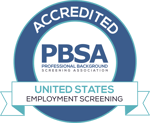-jpg.jpeg)
The background check industry has been under strain in the last 18 months with court delays at an all time high. In 2019, COVID-19 raged through the country, shutting down normal business operations of most courts. Just when they started opening back up, new rules and regulations began to pop up that drastically impacted the background check process. Now, the new delta variant is sweeping through the nation, closing some courts, and limiting access to others, consequently slowing down background check times considerably. Let’s dive into to why delays are occurring, and the impact on your hiring.
Identifiers
Before we get into the meat and potatoes of court delay issues, let’s first review how background check identifiers are used.
Consumer reporting agencies, like Choice Screening are bound to many regulations set in the Fair Credit Reporting Act, or FCRA for short. One of the major requirements is we can only report criminal record cases with two identifiers. Identifiers, also known as Personally Identifiable Information (PII) can be anything that uniquely identifies the individual, such as: name, dob, address, driver’s license number, SSN, etc. We cannot conclude a record is for a specific person with only one identifier.
Now that you are an expert in all things PII. Let’s look at how the California DOB Redaction is impacting turnaround times due to lack of identifiers…
California DOB Redaction
A recent California Court case, All of Us or None of Us v. Hamrick, has impacted background screening in a big way. The CA Court of appeals issued a decision on this case that removes identifiers, including date of birth from criminal court records; and removes the date of birth field from online portals and public-access terminals in courthouses. In addition to removal of the DOB redaction, Los Angeles County issued a new policy August 20, 2021 in which court clerks will not verify the full date of birth, only the month and year.
Impact of California DOB Redaction
Criminal record searches with cases will require clerk assistance and will be delayed significantly. Criminal record searches that do not require clerk assistance will continue to have the same turnaround time as before.
The California Supreme Court denied a review request from the Professional Background Screening Association (PBSA), CDIA, and other organizations. The PBSA will be working together with the California Judicial Council to attempt to modify the rule. But ultimately, the denial by the Supreme Court means that California criminal record checks will continue to become increasingly slow and difficult to obtain.
Michigan DOB Redaction
Recently the Michigan Court Rules changed, and now limits Personally Identifiable Information (PII) in public records, making the date of birth unavailable. The implementation is delayed until January 2022 however, many Michigan courts have implemented this new change already. Like the CA DOB Redaction, this means delayed results for MI criminal records searches.
COVID-19 Delays
Many states and counties throughout the country continue to have delayed background checks due to limited hours operation and/or limited access to the clerks. This includes:
Arkansas: Jefferson, and Pulaski counties delayed.
Georgia: Chatham, Clayton, Fulton, Gwinnett, and Richmond counties delayed.
Kentucky: all counties delayed.
Louisiana: some counties delayed.
Massachusetts: all criminal courts delayed.
Mississippi: some counties delayed; Lee Tallahatchie, Union, Washington counties are closed until further notice.
Tennessee: most counties delayed
Thank You for Your Patience
We understand the challenges court delays create while hiring and background screening applicants. We will continue to work diligently to continue to offer accurate and timely background checks and find resolution to these issues. Please contact us if you would like to consult with one our account advisors.
As part of any good hiring strategy, partner with a background screening provider you can trust, stay informed, and don’t forget to consult legal counsel. Please note: this blog is not all-encompassing and is not meant to provide legal advice.


